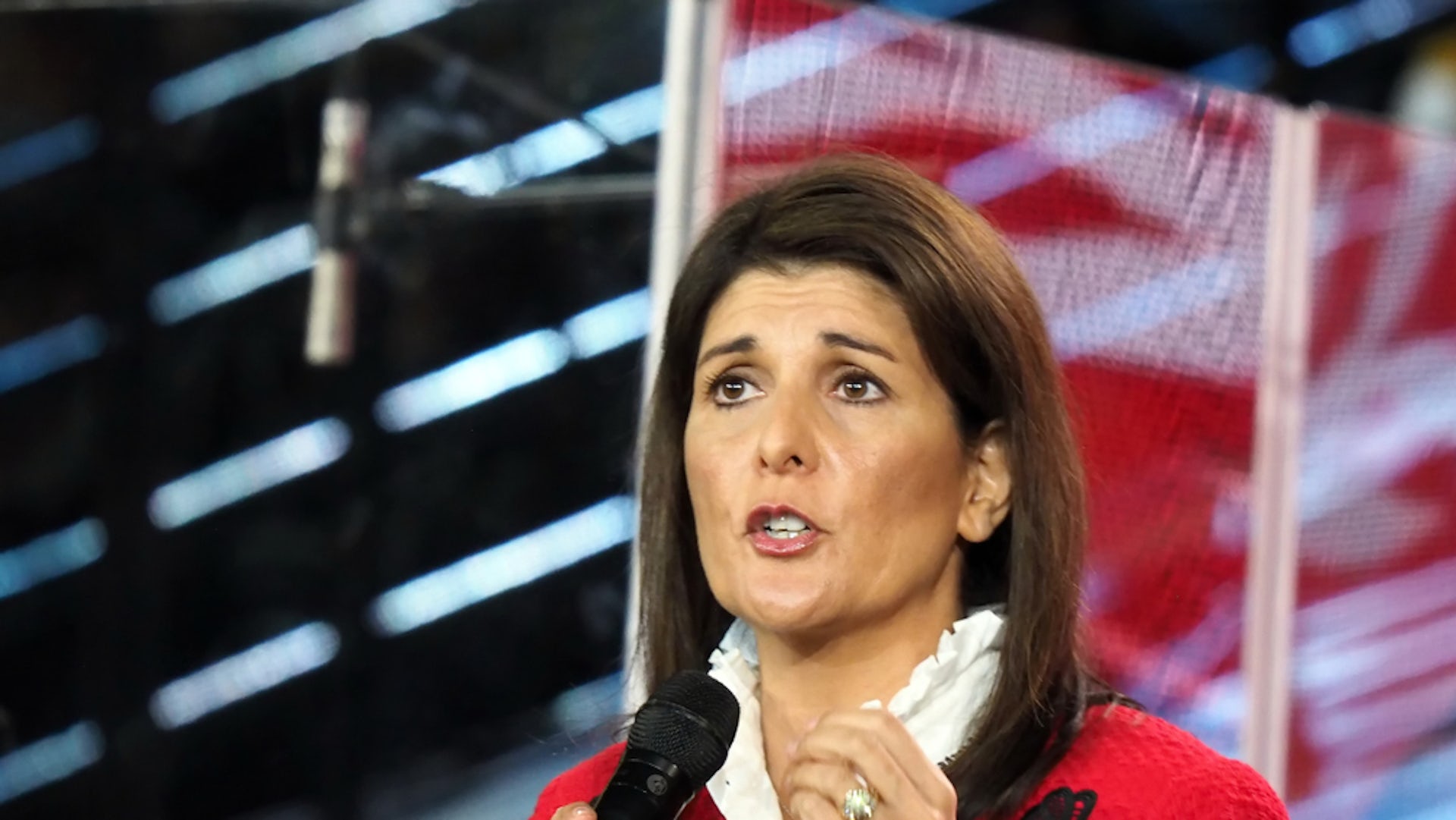“The Washington establishment has failed us … It’s time for a new generation of leadership to rediscover fiscal responsibility, secure our border and strengthen our country.” These are the words of former South Carolina governor and former US ambassador to the UN Nikki Haley, as she formally announced her candidacy for US president.
Haley entered the 2024 race on February 14 2023 with a strong electoral résumé, having never lost an election. She was elected to the South Carolina legislature in 2004 and ran for governor in 2010, winning narrowly, but coasted to victory in 2014.
Her winning record will now be tested by a growing field of candidates, including the clear leader for the Republican nomination: Donald Trump.
Haley was born in Bamberg, South Carolina. The daughter of Indian immigrants, she attended Clemson University on a scholarship to study textile management. After graduating she returned home to work in her mother’s business.
Haley and her husband Michael married in 1996 and have two children. Shortly after marriage she converted from Sikhism to Christianity, stating: “We chose Christianity … because of the way we wanted to live our life and raise our children.”
Breaking political records
Haley was the first woman and first person of colour to be elected as the South Carolina governor. At 38, she was the youngest governor of any state in the union at the time.
She rose to national prominence in 2015 following a mass shooting at an African-American church in Charleston. In the aftermath of this atrocity Haley called for the removal of the Confederate flag from the grounds of the South Carolina statehouse.
When then president-elect Donald Trump announced her as his pick for US ambassador to the UN, Haley made history again, this time as the first Indian-American in a presidential cabinet.
Haley entered the 2024 race having previously said she would not seek her party’s nomination for president should Donald Trump run for a third time. In January 2023, Haley explained her rationale for this change of heart, stating:
I think it’s time for new generational change. I don’t think you need to be 80 years old to go be a leader in DC.
Competency test for over 75s
Highlighting her age will be a key campaign strategy for Haley. At 51 she is significantly younger than both Donald Trump and president Joe Biden. In remarks to the annual Conservative Political Action Conference in March 2023, Haley called for all politicians over the age of 75 to pass a mental competency test.
With seven months to go before the first Republican presidential primaries, Donald Trump remains on course for the party’s nomination, despite reported indictments for handling top-secret documents. National polling puts Trump on 54% as of June 8 with Haley trailing back in fourth place (behind Florida governor Ron DeSantis and former vice-president Mike Pence) on 5%.
Haley is also behind on national endorsements with only one congressman having offered his public support. In comparison Trump has multiple congressional endorsements, including the backing of ten senators.
Nikki Haley launches her campaign.
In recent weeks Haley has sought to reaffirm her conservative beliefs. In May she pledged to sign a federal abortion ban if elected president.
Haley has also spoken out against “red flag” gun laws designed to allow authorities to temporarily confiscate firearms from individuals deemed a threat to themselves or others. And on June 4 her critical remarks about transgender children and sport at school caused controversy.
It is within foreign affairs policy that Haley has sought to differentiate herself from Trump. In February 2023, the former president praised Russian president Vladimir Putin’s invasion of Ukraine, and has subsequently been non-committal on aid for the country should he return to the White House.
Haley has been critical of this position and called for continued military and financial support for Ukraine.
Three challenges
As well as low poll numbers and a lack of important political endorsements, Haley faces three further challenges.
First, the number of Republican candidates already declared (currently at 12) is strategically favourable to Trump, as they divide the votes for a non-Trump candidate. Also, the rules for deciding allocation of delegates in Republican primaries are determined by individual states.
The vast majority of these operate a winner-takes-all outcome. For example, in the 2016 Florida Republican primary Trump won 45.7% of the vote and consequently all of its 99 delegates.
Elaine Kamarck, senior fellow at the policy organisation The Brookings Institution, said that in the 2016 primaries and caucuses: “Trump won 45% of the votes … but because of the rules for allocating delegates, he won 70% of the votes on the first ballot at the convention. These results are likely to be repeated in 2024 if Trump faces a large field of candidates.”
Haley’s second difficulty is her party’s apparent “woman problem”. In a December 2022 USA Today poll 50% of Republicans said the ideal president would be male, while only 2% preferred a female in the oval office.
A CNN poll in May suggests only 6% of Republicans would make Haley their first choice, although 61% say they would consider her.
The final problem for Haley rests with Trump. If she’s able to gain momentum in the primary contests and fight the former president all the way to the Republican nomination in 2024, Haley will encounter Trump at his most vicious and with an ability to take a “scorched earth” approach to his opponents.
There will be a lot of campaigning (including TV debates), between now and January 2024 that could change voters’ minds. At this stage in the race, however, Nikki Haley’s path to the White House remains tricky.
Richard Hargy does not work for, consult, own shares in or receive funding from any company or organisation that would benefit from this article, and has disclosed no relevant affiliations beyond their academic appointment.



 U.S. to Begin Paying UN Dues as Financial Crisis Spurs Push for Reforms
U.S. to Begin Paying UN Dues as Financial Crisis Spurs Push for Reforms  Japan Election 2026: Sanae Takaichi Poised for Landslide Win Despite Record Snowfall
Japan Election 2026: Sanae Takaichi Poised for Landslide Win Despite Record Snowfall  Trump Signs “America First Arms Transfer Strategy” to Prioritize U.S. Weapons Sales
Trump Signs “America First Arms Transfer Strategy” to Prioritize U.S. Weapons Sales  Trump Says “Very Good Talks” Underway on Russia-Ukraine War as Peace Efforts Continue
Trump Says “Very Good Talks” Underway on Russia-Ukraine War as Peace Efforts Continue  India–U.S. Interim Trade Pact Cuts Auto Tariffs but Leaves Tesla Out
India–U.S. Interim Trade Pact Cuts Auto Tariffs but Leaves Tesla Out  Ohio Man Indicted for Alleged Threat Against Vice President JD Vance, Faces Additional Federal Charges
Ohio Man Indicted for Alleged Threat Against Vice President JD Vance, Faces Additional Federal Charges  Trump Lifts 25% Tariff on Indian Goods in Strategic U.S.–India Trade and Energy Deal
Trump Lifts 25% Tariff on Indian Goods in Strategic U.S.–India Trade and Energy Deal  New York Legalizes Medical Aid in Dying for Terminally Ill Patients
New York Legalizes Medical Aid in Dying for Terminally Ill Patients  Missouri Judge Dismisses Lawsuit Challenging Starbucks’ Diversity and Inclusion Policies
Missouri Judge Dismisses Lawsuit Challenging Starbucks’ Diversity and Inclusion Policies  Trump Allows Commercial Fishing in Protected New England Waters
Trump Allows Commercial Fishing in Protected New England Waters  Trump’s Inflation Claims Clash With Voters’ Cost-of-Living Reality
Trump’s Inflation Claims Clash With Voters’ Cost-of-Living Reality  Jack Lang Resigns as Head of Arab World Institute Amid Epstein Controversy
Jack Lang Resigns as Head of Arab World Institute Amid Epstein Controversy  U.S.-India Trade Framework Signals Major Shift in Tariffs, Energy, and Supply Chains
U.S.-India Trade Framework Signals Major Shift in Tariffs, Energy, and Supply Chains  Nighttime Shelling Causes Serious Damage in Russia’s Belgorod Region Near Ukraine Border
Nighttime Shelling Causes Serious Damage in Russia’s Belgorod Region Near Ukraine Border  US Pushes Ukraine-Russia Peace Talks Before Summer Amid Escalating Attacks
US Pushes Ukraine-Russia Peace Talks Before Summer Amid Escalating Attacks  Netanyahu to Meet Trump in Washington as Iran Nuclear Talks Intensify
Netanyahu to Meet Trump in Washington as Iran Nuclear Talks Intensify  Trump Endorses Japan’s Sanae Takaichi Ahead of Crucial Election Amid Market and China Tensions
Trump Endorses Japan’s Sanae Takaichi Ahead of Crucial Election Amid Market and China Tensions 
































